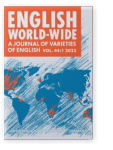Vol. 44:1 (2023) ► pp.34–60
Nigerian English as a Lingua Franca
Intelligibility and attitudes in German-speaking contexts
This paper investigates the use of Nigerian English in lingua-franca interaction in Germany, focussing on the perspective of the German listener. Fifty-eight German-speaking respondents were asked to transcribe short extracts from English interviews recorded with Nigerian immigrants and sojourners resident in Germany. In addition to testing comprehension, respondents were requested to rate samples along parameters designed to measure speaker likability and competence. The study’s two major findings are that, in spite of the absence of contextual clues, respondents perform better than expected in the comprehension task, but that the single greatest obstacle to comprehension is the presence of German-language material in the stimulus. As realistic English as a Lingua Franca (ELF) interaction in Germany necessarily involves a level of English-German mixing, the experiment thus points to a major practical problem in ELF interaction. The study also yields provisional findings on gender (with male voices being understood better than female ones) and interactions between assumptions about speakers and transcription performance that should be revisited in future research.
Article outline
- 1.Introduction
- 2.Intelligibility and evaluation of Nigerian accent(s) of English: Review of research
- 3.Study design: Data and methods
- 3.1Recordings
- 3.2Questionnaire and data collection
- 3.3Transcription evaluation
- 4.Results and discussion
- 4.1Preliminary observations
- 4.2Quantitative analysis
- 4.2.1“Placing” the accent in the audio stimuli
- 4.2.2Factors promoting/inhibiting transcription performance
- 5.Conclusion
- Notes
-
References
